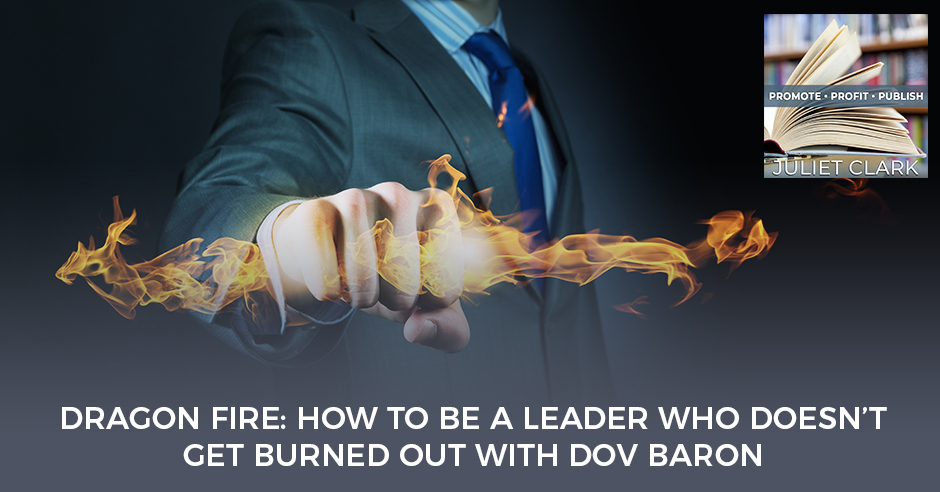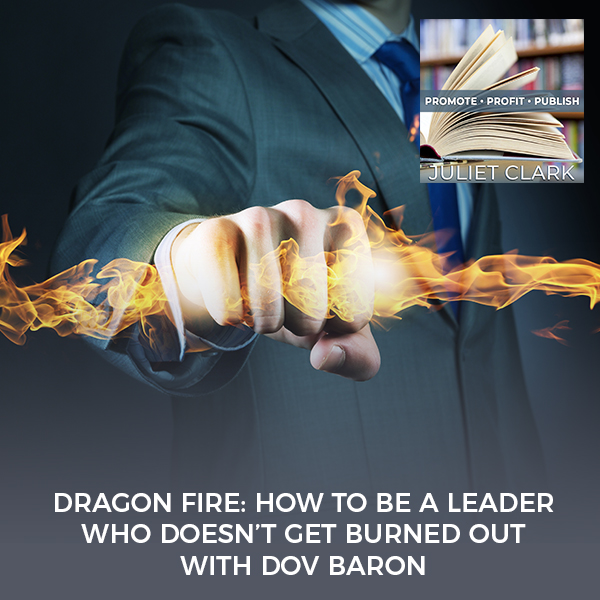
One of the most common crisis we see in many leaders today is burnout. However, when you look at some of the most popular entrepreneurs like Elon Musk or Oprah Winfrey who work harder and longer than others, they don’t seem to be burned out. What is the difference? Dov Baron identifies this difference as dragon fire. The leading authority when it comes to actualized leadership, Dov joins Juliet Clark to talk about the concept of dragon fire and dragon leaders who don’t make it an option to get burned out.
—
Watch the episode here
Listen to the podcast here
Dragon Fire: How To Be A Leader Who Doesn’t Get Burned Out With Dov Baron
I’m so glad to have you guys on board. Before we get started, I want to invite you to go over and follow us, like us over on YouTube. Please leave us a review over here. Let us know what you think of the program. If you get a chance, go over and take the Promote Profit Publish Quiz at PromoteProfitPublishQuiz.com and find out where your skillset is. If you’re ready to publish if your audience is in place.
Our guest is Dov Baron. Dov Baron is The Dragonist, guiding us on how to recognize and nurture our dragons, that’s a top talent, hidden in our organizations. A dragon leader is not a position. It’s someone who’s always pushing to improve and wants those they serve to reach their full potential. Dov’s humor and no-BS style are contagious. As a master storyteller, he’s considered to be the leading authority on actualized leadership. It means getting the result you set out to achieve in the most meaningful manner possible.
Working with diverse leaders and executive teams, Dov filters common bonds to create Fiercely Loyal cultures. You can’t achieve loyalty without meaning and talent only stay when they feel they are part of something larger than themselves. Besides being the bestselling author of One Red Thread and Fiercely Loyal: How High Performing Companies Develop and Retain Top Talent, Dov has been named one of Inc. Magazine’s Top 100 Leadership Speakers To Hire and is one of the Top 30 Global Leadership Gurus. He’s spoken to the United Nations, World Management Forum in Iran, the New York National Speakers Association, and The Servant Leadership Institute. Welcome.
Thank you. It’s good to be here. It’s an honor and a pleasure. I’m excited to serve.
I’m excited to have you. We don’t have accented people on often and that accent is adorable. It’s from?
It’s labradoodle. It’s a bit of everything. I was born in the UK but I’ve been gone for more than 40 years. I was in France and Italy. I lived in the East Coast, Canada for a year. I was in Asia, in Indonesia and then I lived in Australia for many years before moving to the West Coast. I can do a whole lot of different accents depending on what you’d prefer. If you’d like an Irish one, I can do an Irish one. If you like Scottish, I can do a Scottish if you prefer that. It’s up to you, any way you like it.
Being in touch with your dragon fire makes you serve at a greater level without burning out. Share on XYou guys can tell this is going to be entertaining.
I can also do many ones that are considered inappropriate but those are for the off record.
Tell us a little bit about The Dragonist. What is that all about?
As you know, the work I’ve been doing for years has been helping leaders to become their very best. That is a general, broad umbrella statement that doesn’t tell anybody anything. When we were looking at this, years ago but what is it that I do? One of the things that I’ve seen as a common crisis is burnout. You may have noticed that I’ve said often that we live in a culture where the religion is hustle and the high priest of hustle is Gary Vaynerchuk. I do love him. He’s great but not everybody is Gary. A lot of people are busy trying to be Gary and they ended up burned out.
They’re firing ahead with this dream, idea, and headspace of becoming that big and they ended up burned out. At the same time, the entrepreneurs become burned out. The answer is no because if you look at Elon Musk, if Oprah Winfrey, or Dwayne Johnson, those kinds of people, they all talk about work, love work, work harder, and longer than most other people. What do they have that other people don’t have? If they’re not burning out and they’re still entrepreneurial and other entrepreneurs are burning out, what’s the difference? The difference is dragon fire. Dragon fire cannot be put out. It doesn’t get burned out because it is not a concept in their head, it is your heart and soul that’s on fire to serve at a greater level. That’s what being in touch with your dragon fire does. That’s what I’m masterful at finding in people. I find out what their real true dragon fire is which is not their passion at all. It’s not their joy. It’s their dragon fire. Is it your passion? Not at all.
Explain that. What’s the difference between the two?
You can remember being sixteen. I can vaguely remember it. I can remember what I was passionate about when I was 15, 16, 17, and 18 years old. If that was supposed to be my life’s path then I’d be the manager of Victoria’s Secret but that was not my path. The thing with passion is it is transitory. Many of the things that we were passionate about when we were in our teens, 20s or 30s, they changed and evolved. This is what I want to remember and understand. Passion is a vehicle. If you’re an entrepreneur, you might be thinking, “I’m so flaky because I’m always changing things.” No, your vehicle is out of fuel, that’s it, it’s done. Your vehicle transports your dragon fire. It’s the way to move from a place to a place to serve the dragon fire. That is much deeper and it doesn’t change. It evolves and it deepens but it doesn’t become something else.
When you see people who get stuck, they’re not in it.

Dragon Firs: Dragon fire is in all of us. Unfortunately, many companies, organizations, and leaders stifle the dragon fire and try and get the person to do what they want them to do.
They’ve lost touch with the dragon fire and the dragon fire is there in all of us. Unfortunately, many companies, organizations, and leaders will stifle the dragon fire and try and get the person to do what they want them to do. They’ll do dictatorial or authoritarian leadership. Remember that we, as human beings, have a desire and our desire is to fit in. We want to belong. We’re tribal. That’s what human beings want. My pushback on that is don’t try and fit in. You have a drawer or a closet and in order to fit something in, you have to push things out of the way, squish things up, and get it to fit in there.
You don’t want to fit in anywhere because we’re not looking to make you smaller or taught you to fit in. What you want is a place to belong. The reason that I love dragons is because dragons are big. They’re not playing small. They don’t walk into a room and a little puff of smoke goes off. They walk in and there’s a dramatic entrance to that. Not from grandiosity, but from a place of presence. You don’t want to fit in, you want to belong. You want to flair your wings and breathe your fire into a situation. That is very different. Many companies and organizations are trying to get people to conform and fit in. They don’t realize that they’ve got dragons in their organization. If they make space for them, they would completely evolve with the business that we grow and develop it for them. They want to do that.
A lot of people leave Corporate America because of that. They can’t do it anymore. I was one of those. I wanted to have my own business. When you’re inside of a company, do you find that it’s the older managers who are having a hard time changing and embracing this?
Let’s talk about this from a place of psychology because the most important thing to the ego-mind, which we all have is to survive. The way that we survive is we find out what works. Whether you are 15 or 75, you worked out how to survive. How do I know? Because you’ve made it this far, whatever this far is. As a result, you’ve likely built some habits based on your survival. Those habits might suck, unhealthy, dysfunctional, and destructive but they keep you alive and keep you surviving. Therefore they keep you wanting to be right about the thing that’s helped you survive, even if it’s crap or dysfunctional. That’s why it’s difficult to change. It’s not that it’s about age or any of those things. It’s how embedded we are in being right. The more we can give away the desire to be right and shift that to being true for me, then you can constantly evolve. You can keep deepening, growing, and transforming into a deeper sense of yourself.
I have encountered what you’re talking about with older leaders struggling with the change but I’ve also had that with younger leaders too because they’ve been egoic. You don’t know because you’re old. The other way, you don’t know because you’re young. Neither of you knows because the truth is, are you open to growing? The three most damaging words you’ll ever use that will inhibit your growth, development, and business are “I know that.” Immediately, you say those three words, you’ve shut your mind down, you’re no longer available to learn and grow, and you have put a block on everything that could make you grow. Even if you go, “The thing is I do know this stuff.” No, you don’t. They go, “I do.” My question is, “Are you living it?” They go, “I think so.” “Are you living it 100%?” “No.” “Would you like to?” “Yes.” “Shut up and listen.”
I remember a culture changer coming in into a workplace that I was at. He said to us, “Congratulations, the good news is you survived your childhood. The bad news is you’ve survived your childhood,” and went on and explained what you did. Those habits and places where our trigger points are. That happens a lot when we’re in those conforming situations with those and everybody is inflexible too. How do you get people out of that mode when you go into a culture?
There are a couple of things we can do around that. I remember I said that your dragon fire is not your passion or joy. Your dragon fire is found in your pain and we don’t want to look there. As Carl Jung and Joseph Campbell said, “That is the place you need to look.” Campbell said, “The treasure you seek is hidden in the cave you’re afraid to enter. It’s that darkness that we step into.” It’s there metaphorically in every single story that matters. Think about Star Wars that Luke is being trained by Yoda. He has to go into the dark cave. He says, “What will I find in there?” Yoda says, “You will see.” He says, “Will I find Vader in there.” He says, “You will see him.”
Passion is a transitory. Many of the things that we were passionate about when we were younger change or evolve. Share on XWhen he goes into the cave, he’s terrified and he meets Vader. When he pulls Vader helmet off, he sees himself. He has to look at his own darkness. This is the thing that we have to do. We have to look at where we’re stuck. Where is the pain? Your dragon fire comes from your pain. They said, “Why does it have to come from there?” We are amazing humans. We want to serve and make a difference but what’s in our way is this desire to survive and keep things the same way. It’s a push-pull that’s going on inside of us. Years ago, they used to say AA in twelve-step programs and you’re going to do it for yourself. They realized that doesn’t work because people were shooting needles into their arms and drinking themselves into oblivion for themselves.
They stop for someone else because they love their children, wife, or they’re destroying their family. They go, “I can’t do this to them anymore.” What gets us to move and face the pain is the desire to make sure somebody else doesn’t go through that pain. That’s why when people join those programs, they go out and they recruit other people where you say, “I don’t want you to suffer this way. I suffered. Let me help you with that.” This is the thing we have to learn to do is we have to turn into the pain and say, “Who else can I help come out of similar pain?” That’s where my dragon fire is. I’ll give you an example. A person who has become a friend of mine who is in the top five branding people in the world. He is massive. He works with huge organizations for fees that are beyond most of us. We’re working together. I interviewed him on one of my shows. He says on the interview, “I resist this idea that my dragon fire is in my pain.” I said, “I understand. You’re wrong, but I get it.”
I’m laughing with him. He was like, “How?” I said, “What do you do for a living?” He goes, “Branding.” I go, “What’s the main message of your branding?” He says, “That’s simple. I make people stand out in a world where they’re invisible.” I said, “Cool.” I go off on a tangent and I have looped him back and said, “Tell me a little bit about your childhood.” He says, “I was a brown kid in a mixed-race family. I didn’t fit in with black people. I didn’t fit in with white people.” I said, “You mean you felt invisible.” He goes, “Yes.” I said, “What do you do for a living again?” He went, “Damn, you’re right.”
It finds its way to come to the surface. Once you can tap and hone that, that’s your superpower. Tapping into that, bringing up forward, it’s so magnificent. It brings such joy to you every single day, watching people step in and go, “Oh my God.” He calls me, we talk all the time and he goes, “It was so great this person was completely unknown and I’ve helped them with this.” He does a little bit of work on the side that he helps people outside of the big corporations. He goes, “This artist who was completely unknown got picked up for this gallery and they’re doing all this.” He’s so excited because somebody who was an invisible artist, suddenly become right at the forefront. He’s fulfilling his dragon file.
What are some of the problems you typically see inside of these big companies?
There are all kinds of them. The first thing I will often ask is, “Have you read Simon Sinek’s book Start With Why?” They’ll say, “Yes.” I go, “What’s the first word of that title.” They go, “I don’t know. Let me think. Start.” That’s what we want to do. You want to understand this is the start. It’s great stuff. I love Simon’s work. I’m a fan but it’s a start. What’s underneath that? They go, “What is it all about? Your why and your purpose?” I go, “No, it’s about the why of your why.” They go, “What’s that?” “That’s your dragon fire. Tell me your purpose.”
They tell me that’s not your purpose. When people say, “This is my purpose.” It’s not. It’s a mission statement with a lacquer paint or better polish to make it look a bit better but it’s a mission statement. Because when you’re in dragon fire, that has an emotional connection to you. A mission statement is like, “That’s catchy. That’s good. I like it.” It’s got some marketing ring to it. Dragon fire doesn’t. Dragon fire is like, “This is what it is. This is what sets me on fire every morning to drag me out of bed whether it’s COVID-19, 1919, 2019, or 3019. It doesn’t matter whether the world’s on fire. I’ve got to get out of bed every day because this is why.” That’s the number one problem. Therefore, if you don’t have a company that’s built on dragon fire, then I said, “Do you have your core values?”

Dragon Firs: Your maxims have to be built on the dragon fire of your organization. From there, you build a culture where people are fiercely loyal to the dragon fire, to the maxims that support it.
Most of the established companies do. They had these and then I’ll say, “Okay.” Oftentimes, those are not the values but I’ll say, “Those are the values. You’ve got value like integrity, now tell me, what does it mean?” “We were integral. We’re transparent.” “What does that mean?” These are nothing more than words that are thrown around because they’re in vogue and they won’t be out of vogue in years and nobody gives a crap. You’ve got this set of values that nobody understands. Your values are your maxims which are deeper than your values. Your maxims have to be built on the dragon fire of your organization. From there, you build a culture where people are fiercely loyal to the dragon fire, to the maxims that support it and the culture is built on that.
One of the challenges is they don’t have people who are loyal because people only follow what’s meaningful. They will only stay with what’s meaningful. There’s a point where you go, “I’ve got enough money and it doesn’t matter.” It’s not about a salary anymore, “I want to get up and go to work in something that makes a difference.” That’s dragon fire. It’s dragon fire, it’s value/maxims, and then it’s a culture that creates loyalty. Those are what we deal with.
How do you deal with startups? Do you work with them a lot where you come in from day one, “This is what we are?”
Startups have a different set of challenges. They’re easier because they’ve usually not done the work so there’s not much to undo. The downside of them is they’re so hungry to make a dollar that they’re not paying attention oftentimes until it’s too late. We got to work with a wonderful health technology company who were in the early stages. They’d gotten their first $20 million. I had been privately working one-on-one which is another part of my business that I worked with higher-level leaders. I’d been privately working with the CEO. He brought me in to work with the company when they were at that first stage. As a result, there was a lot of resistance.
I have a meeting with the Chief Health Office and he’s my biggest advocate but when he started, he’s like, “I don’t have time for this new age California woo-woo crap.” Now, he’s always telling everybody, “You’ve got to go and talk to him.” He says, “I’ve got meetings with the FDA, Russia, and China.” He’s all over the world all the time. There’s that feeling of anxious and got to get moving. He said, “I don’t have two days to sit around and do this.” At the end of the first half day, he was like, “This is powerful. I’ve got this.” It transformed their business. As a result, within two and a half months of us finishing that first stage, they were able to raise $100 million.
What happens when you go in? I hear this a lot from people that a company will bring someone like you in, and then it turns out the guy at the top doesn’t want to change. What do you do in those situations? It’s always a top. You can’t tell your worker bees, “You have to change but I’m not going to.”
That’s central to the work that we do. We pick our clients. We’re different than a lot of companies. You can’t send us a check and say, “Come on in.” We go, “Let’s do an interview and we’ll see whether we can work with you.” It’s not the other way round. We’re going to interview you and they go, “You’re going to interview me and I’m going to pay you a check.” “Yes.” “Why?” “Do you know what integrity means? Integrity means it has to be aligned with my dragon fire to serve you.” That’s one of the reasons that I personally work with about five new clients a year privately who are my one-to-one clients. My one-to-one clients are entertainers, athletes, CEOs, finance, those kinds of people.
They end up bringing us in to work with their company. We don’t work at the managerial level. We work at the executive level and we will say, “We worked with a company that was building a development company.” Two-thirds of the way through, I said, “If this doesn’t change by the next meeting, we’re out.” “What do you mean?” “I cannot do this with you in constant resistance because you don’t want to change. That’s okay. You don’t have to change but I can’t work with you if you don’t want to change. You brought me in because you want this. You were very enthusiastic about it, but it’s not for everybody else. It’s for you. You personally.” We’re working with each individual in that executive team to build this.
Your dragon fire comes from your pain. Share on XThere’s a personal dragon fire that each individual has. There’s a collective dragon fire that the company has that’s made out of all of the executives, and then they’re all buy-in. They have to then do the same thing with each member of their team. Nobody is going, “You worker bees have to do this.” It’s like, “Here’s what we did with Dov, here’s what happened, and here’s why we want you to do it. We want to walk you through this exercise and have you find yours?” “You’re doing it.” “I’ve noticed you’ve changed, John. I’ve noticed you’ve changed, Susan. That’s fantastic. Let’s do it.”
That is the kiss of death and a big waste of money when the top guy brings somebody like that in and then doesn’t think that he’s part of the mix of what’s going on inside of his own culture.
This is the challenge with cultures. People are going and they’ll say, “Tell me about your culture.” They’ll hand me a brochure. I’m like, “What’s this?” He goes, “My culture.” “No, it’s not. It’s a brochure.” “You know what I mean? It’s our culture.” “No, it doesn’t.” They go, “It does.” I go, “If I randomly pick something out of this, anything, you can tell me that everybody’s living by that.” This is not so contemporary now but it used to be which is everybody has to be at work by 8:00 AM. Nobody can leave by 5:00. We know things have changed in that world now, but I said, “If no one is around and there’s no boss, does everybody show up on and is in work by 8:00?”
He goes, “Probably not.” “It’s not your culture.” He goes, “What do you mean?” “Culture is very simple.” If you want to understand what culture is, it’s called permission. It’s permission given when no one is looking. Here’s the thing. If people are showing up randomly, whenever they want, that’s the culture. You’re no stealing but you allow people to steal the pens. To you it’s okay. It doesn’t matter. It’s about the permission. We have to step into saying, “What is our real culture? Is the culture built on these maxims that is foundationally held inside of this dragon fire because now we know this is the actual culture?”
You have a podcast if people want more of you. My understanding is that you interview top leaders in it. Where can we find more of you?
You can find more me at my name which is DovBaron.com. That’s where you’ll find everything. There’s access to both of my podcasts. I have two podcasts. One is the Leadership And Loyalty Podcast which is the one you were talking about, Juliet, in which I’ve interviewed everybody from political leaders, like Carly Fiorina who ran up against Trump in 2016, Guy Kawasaki, and John Oates from Hall & Oates. People say, “Why would you have John Oates on our leadership show?” Let’s take a look at that. What is one of the industries you can think of that is the most disrupted industry? Music. It’s incredibly disrupted. John Oates has been business partners with Daryl Hall for 50 years.

Dragon Firs: Culture is permission given when no one’s looking.
Do you know a business partnership that’s lasted that long and done that well? Those guys are still out on the road. They were out on world tour end of 2019, beginning of 2020. Business partnership in a disruptive industry. We’ve interviewed all those people. That’s 700 interviews or something on that. It’s fabulous. There’s the Curiosity Bites Podcast where we interview astronauts, quantum physicists, and holy people. The first episode is a four-part interview with an advisor to the World Health Organization about COVID-19. It’s wild and wonderful, amazing conversations that are intense at times, too. I have my own outlet on Thrive Global which is called The Dragon’s Path were we write there. You can find all my articles and blog on the site. YouTube channel is with over 700 videos. There’s a lot of stuff.
He’s everywhere. That’s what he’s trying to say. Thank you so much for taking the time to be on. I appreciate it.
It was my absolute pleasure, Juliet. Before we go, I want to say thank you to you for having me on. Thank you for allowing me to serve your audience. I want to say to you as you’re reading this, do you even understand what it takes to do this? You probably don’t. I do. Juliet goes out, finds great guests for you, has them bring them knowledge and wisdom for you so that you have value. There’s no charge to you. You get this and she needs to know that it adds value to you. You need to write to her, you need to add comments on YouTube. You need to go onto wherever you tune in and subscribe, review, and share it with your friends. Write to me, I’ll give you my personal email, Dov@DovBaron.com. Tell us what you got out of this and what you’re going to do with it because the information is worth the whole in a donut. Transformation comes from application. What are you going to do with this? Share the show with everybody you know and if I can be of service to you in any way, write to me, I’ll answer you. I do answer my emails. I’m here to serve. Thank you for giving us your time, energy, effort and commitment.
Thank you.
Important Links
- YouTube – Superbrand Publishing
- PromoteProfitPublishQuiz.com
- One Red Thread
- Fiercely Loyal: How High Performing Companies Develop and Retain Top Talent
- Start With Why
- DovBaron.com
- Leadership And Loyalty Podcast
- Curiosity Bites Podcast
- First episode on Curiosity Bites
- The Dragon’s Path
- YouTube – Dov Baron
- Dov@DovBaron.com
About Dov Baron
 Dov Baron is “The Dragonist”, guiding us in how to recognize and nurture dragons (the top talent) hidden in our organizations. A Dragon Leader is not a position, it’s someone who is always pushing to improve and wants those they serve to reach their full potential.
Dov Baron is “The Dragonist”, guiding us in how to recognize and nurture dragons (the top talent) hidden in our organizations. A Dragon Leader is not a position, it’s someone who is always pushing to improve and wants those they serve to reach their full potential.
Dov’s humour and no-BS style is contagious. As a master storyteller, he is considered to be the leading authority on actualized leadership. Actualized leadership means getting the result you set out to achieve in the most meaningful manner.
Working with diverse leaders and executive teams, Dov filters common bonds to create Fiercely Loyal cultures. You can’t achieve loyalty without “meaning” and talent only stay when they feel they are a part of something larger than themselves. Besides being a bestselling author of One Red Thread and Fiercely Loyal: How High Performing Companies Develop and Retain Top Talent, Dov has been named one of Inc. Magazine’s Top 100 Leadership Speakers to Hire and as one of the Top 30 Global Leadership Guru’s. He has spoken to the United Nations, The World Management Forum (Iran), The New York National Speakers Association, and The Servant Leadership Institute. In June 1990, while free rock climbing, Dov fell approximately 120 feet and landed on his face. The impact shattered most of the bone structure of his face. After ten reconstructive surgeries, no external evidence remains; however, this experience wasn’t just life-changing, it has been completely transformational. Dov shares how Dragons are born in fire, experiences that could potentially destroy you, instead can birth purpose, passion, and hunger to champion others to nurture the Dragon Fire in ourselves, our families, our communities, and our companies.
Dov believes the world needs more “Dragon Leaders” committed to living their purpose, standing in their truth, and empowering others to find their fire and do the same.
Love the show? Subscribe, rate, review, and share!









Leave A Comment